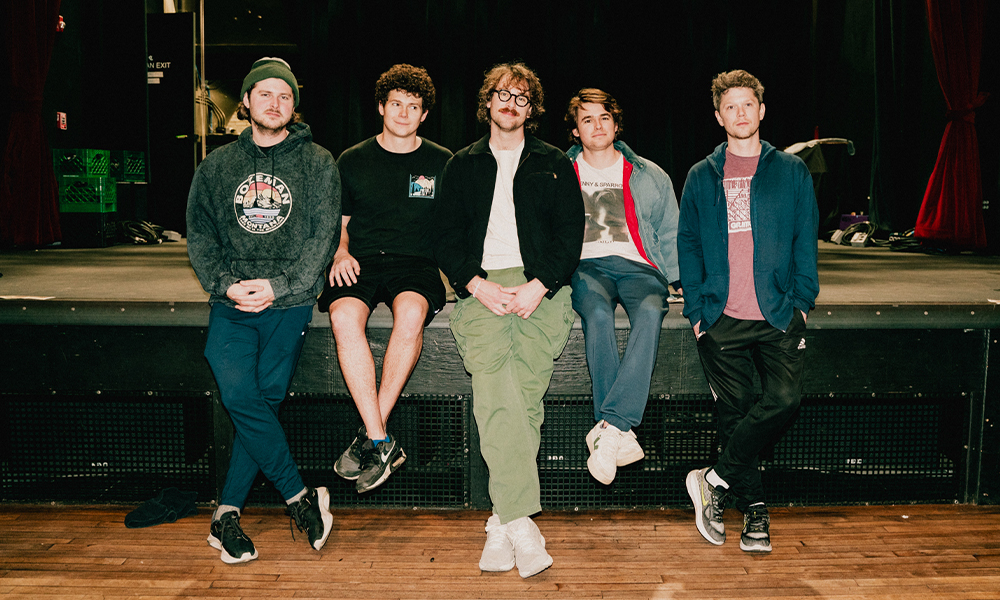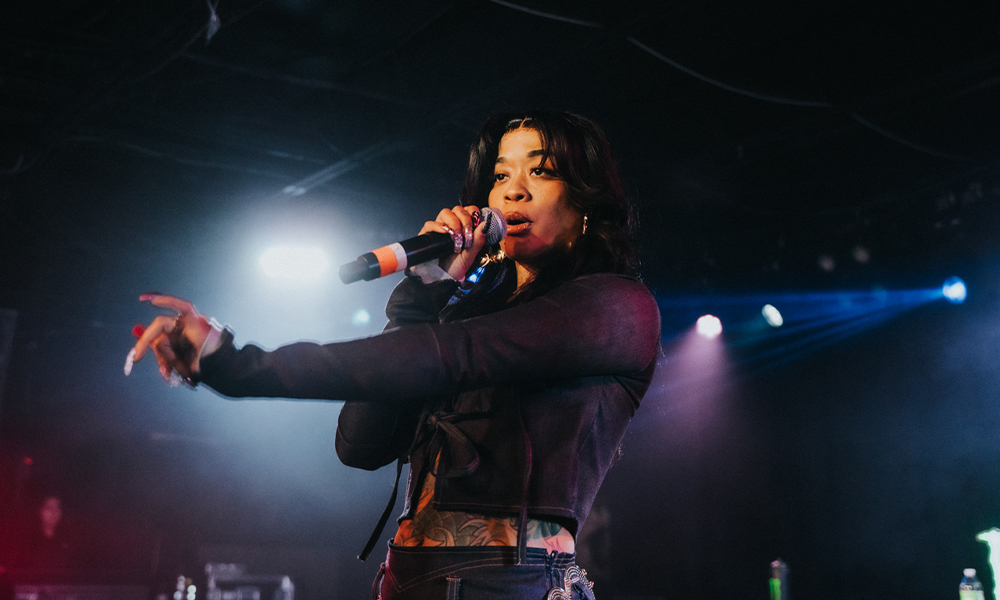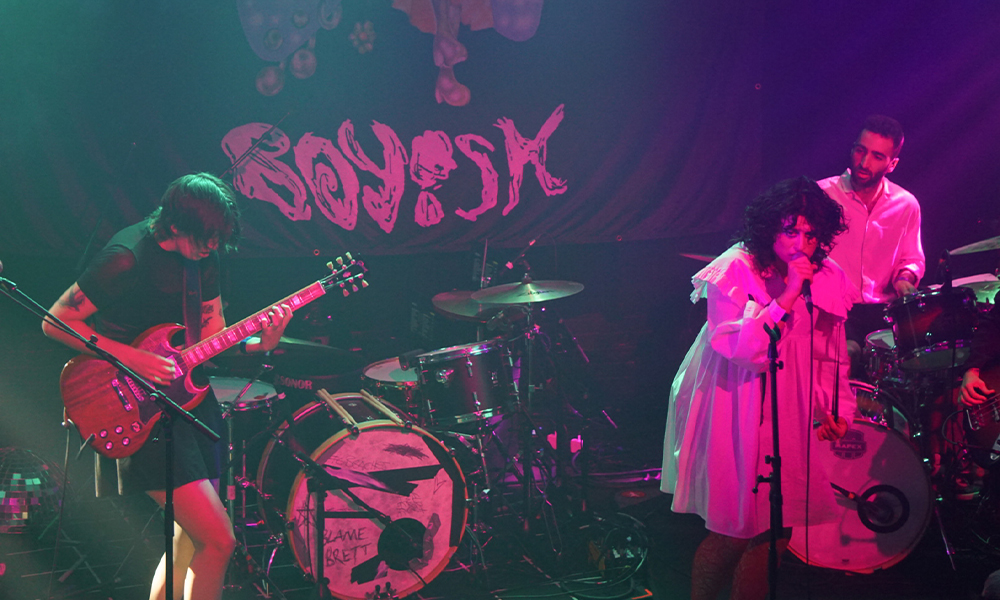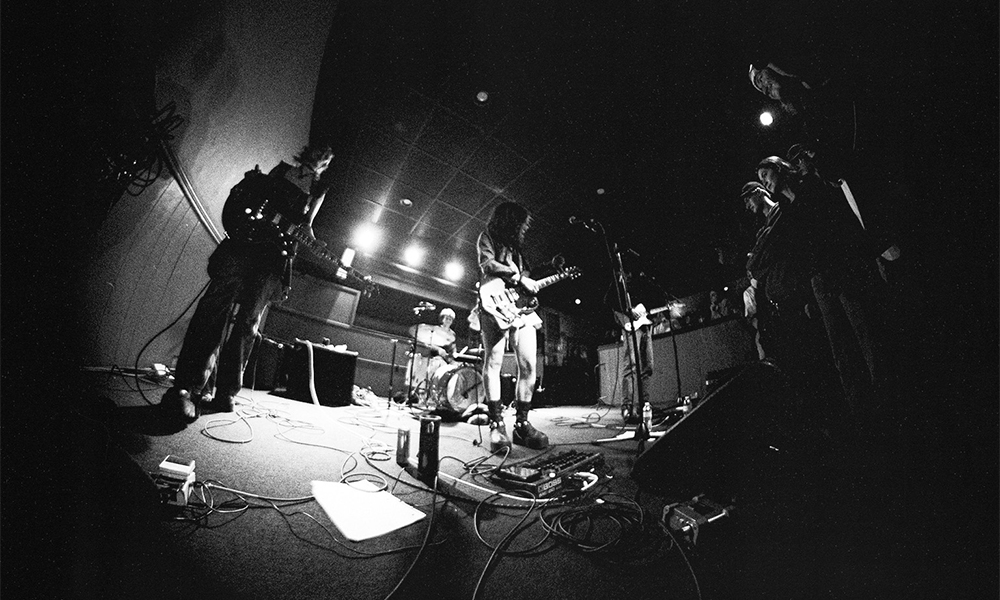Stories resonate with us all— they incite feeling and help us to comprehend the experiences of others and ourselves. Through narratives that hold no bounds like the hurt of heartbreak and tiring nature of perseverance, the band HAWAI seeks to bring you music made up of stories that you can connect with— songs that feels as alive as its listeners. HAWAI is the amalgamation of Jake Pappas (JP) (lead vocals, guitar) and high school friends Jess Dorman (drums) and Jared Slaybaugh (bass vocals) after several past projects and the additions of Matt Gillen (keyboards, synth) and Jack Rose (guitar). The Southern California-based band is a project influenced by experience, hypnotic guitar hooks, the sweetness of the California coast— their music inevitably creating the soundtrack to your summer with their bright, though wistful tunes, on their debut EP, Working All Night. The band honestly manipulates and builds on the compelling and confounding reality of living stories, creating music that is wholeheartedly accessible and eminent to the story that is your own.

Most of the band started making music together in your teens. What was it like playing together in your teenhood and how would you describe the transition from that into the musicians you are today?
JP – I think that we all came from a music background that was implemented into our childhood— not necessarily being a necessity to play an instrument, but it was strongly encouraged by all of our parents that we play an instrument. So, it kind of went from a task to a joy. Once we started to figure out our instruments, we actually learned to love it rather than just do it. At first, the very root of our band is me, Jared [Slaybaugh] the bass player, and Jesse [Dorman] the drummer, we were in an instrumental band called Greystone and it was literally no pressure, fun, no expectations really— we weren͛t trying to make anything of it. We played a couple forty-year-old birthday parties and that was about it. It was just fun! Now, we’ve just grown up a little bit and we have realized it is something that we could make a career and make a living doing. There’s just a little bit more seriousness to it now. We still have that passion and the same excited about it that we did when we were Greystone, but now there’s a seriousness added to it that comes with working and having a job.
When changing from your past band to HAWAI, what were you purposely trying to change with your sound and the band in general?
JP – It was somewhat intentional, but also just the progression of where we were at in our lives. As humans, we are constantly changing and learning and social media is always, always changing and so I think that as a body doing art, it͛s impossible not to always take in those new changes. So, I think we basically went from this folk rock band to a band that grew up a little bit, I guess. The sound that you hear is us evolving with all of the change that had happened when the EP was written. When the collection of songs on the EP were written, I personally had just moved to L.A., my wife and I had just quit both of our jobs to move to L.A. without having jobs, we found out we were pregnant, so it was a whole bunch of emotions in a matter of one instance, so I think that totally influenced what is the sound like, ‘Okay, it’s time to buckle up. We should probably get moving.’ No more Greystone jam sessions at forty-year-old birthday parties!
You are very much a Southern California band. In what ways do you think place can influence a sound?
JP – I think very heavily. I lived in Nashville for two years and what I wrote when I was living in Nashville was our last band was, J. Thoven. The sound of that project versus this project was very heavily influenced based on weather and location and the ocean versus being land locked. You don’t realize until when you come back to California how big of an influence the ocean breeze is and that smell, it’s so euphoric. But that’s not to say that there aren͛t things about Nashville that weren’t euphoric, as well. I’ll never be able to have a backyard in my backyard like I did in Nashville. People had gigantic backyards and just got together to drink whisky and sat around a fire. That͛s just what people did. I think that [location has] a huge part.
Your website says that you want to make music that feels alive. How does music make you as an artist feel alive and how do you think your sound evokes that?
JP – I think that lyrically it’s important to be honest and to make people connect with something that they can relate to. I think that everybody else has different experiences and I translate lyrics differently than others. Something that I’ve always done lyrically that maybe it’s intentional, maybe it’s totally unintentional, but I think for the most part it’s most part unintentional, that the lyrics can just be translated how you want to translate them. So, I think that’s where we want people to feel like the music lives, like, it’s actually living. It’s not just something that stands as, ‘This is how you have to take it. You can’t take it any other way. It’s exactly what I want you to hear,’ instead it’s like, ‘How do you want to take this?’ That’s how we want to leave the music and make people feel like they are able to connect to it.
Your songs are written in a way that is narrative and stories that may not be your own. How do you connect with these stories in your lyrics, even if they are fiction?
JP – I think the same way that people connect to Facebook and Instagram— other people are sharing things and it’s not necessarily your experience, but you’re still moved by it because you are unable to put Facebook down or stop scrolling through Instagram, everybody is always wanting to experience what other people are experiencing. That often becomes the topic of my storytelling, ‘What are other people experiencing?’ because it’s pretty exciting or really troublesome. My wife just got some sad news today that totally moved me like, ‘Woah, that’s gnarly.’ I didn’t write a song about it, but that’s what sometimes influences me to write a song— somebody else’s pain or somebody else’s happiness.


You’ve said that you hope your music helps people, the lyrics specifically. In what way has music helped you or was there a specific moment that you discovered the sort of power of music?
JP – I feel like the first time that I realized that music was actually benefitting me as a person was in high school, I was probably fifteen at the time, maybe sixteen. For the first time a buddy of mine showed me at the time what was quote on quote called ‘indie music’, which is a completely different genre now— I don’t even know what the definition of indie music is now— but at the time this was indie music. So, he showed me and, I think it was either Wilco, Bright Eyes, or Death Cab for Cutie, but it was the first time that I was like, ‘Woah, this is real!’ This isn’t just something that you hear in the background. You could actually connect to it. I think when I realized that music was more than just a sound, that it was a story and it was poetry, it was alive, a living thing! I think that that was really a moment that kind of changed everything in my life. I wanted to be a part of whatever this was doing. This makes me feel a certain way and I want to be a part of this whole ‘making people feel thing’ that is true to this sound. To be more specific, too, the moment where music legitimately made me feel something really heavy— I was at a David Bazan concert and J. Tillman opened (who is now Father John Misty), this was probably eleven years ago. I remembered it being this thing about that show where both J. Tillman and David Bazan played by themselves— J. Tillman with an acoustic guitar and David Bazan with an electric guitar and a tiny, little junior amp. It was something about that show that felt so authentic and so real. There were just no gimmicks. There was no light show. There was no fog. It was so raw. There were probably four hundred people in the audience. It was that moment that I for sure was like, ͚I want to play music for the rest of my life and make people feel this.’
How does it feel to be releasing your debut EP, Working All Night?
JP – It feels awesome!
What do you hope the EP reveals about your band? What do you think bands are going to get from it and discover about you?
JP – I think number one it is frightening to release something, it’s exciting, but there is also a level of terror with releasing anything artistically. I had this English professor in high school who shared this story that something he wants us to learn through his class is publicly sharing your poetry. He was like, ‘I’ll be honest, it’s really scary,’ and he gave this story about how he used to loved writing poems and the first time he shared a poem, he couldn’t really speak, his throat locked up. There is something really similar about that and releasing music [because] what you don’t realize is you are automatically making yourself subject to criticism, so I think that part of it is super terrifying. You know that people are going to have their opinion about it— whether it’s good or bad or okay or amazing, who knows! Everybody is going to have how they interpret or how they feel whatever in their life, everybody is going to feel something different from our music. That is really scary to think about! But at the same time, we just really want people to thoroughly enjoy it in a way where, ‘This is their summer.’ It’s coming out in June, I hope people pick this up and it literally makes their summer like, ‘That was the album that I jammed out to the whole summer.’ That would be cool to do that! I have my records where I’m like, ‘This for sure made my summer, this was my fall,’ all the different seasons! It would be cool to know that this record made people really feel good.


Overall, how would you describe the commitment that you have made for each other and your music?
JP – To us, this is it. This is what we are pursuing. Nobody is going to school at the same time with a backup plan. This is it! You can feel that every time we are in the room together. We all maybe have our bad days, but we also have our really good days, and even during the really bad days, we all still know this is it. Nobody is going to walk in two years from now being like, Guys, sorry, I’m just kind of over it.’ Everyone is really dedicated to it and loves it. We are all brothers and friends, so it makes it a lot easier to accomplish something that you are dedicated to when you have fun doing what you are doing.
What are your hopes going for the band going forward because, as you said, this is it?
JP – We hope to be able to tour the world, share our music with everybody and doing this, just keep playing music and writing and having fun. Just kind of getting lost in the whole world of music and having that be something that continues rather than something that ends. It͛s a lot of fun! We want to just continue this whole process of playing shows and being on the road and all that.















